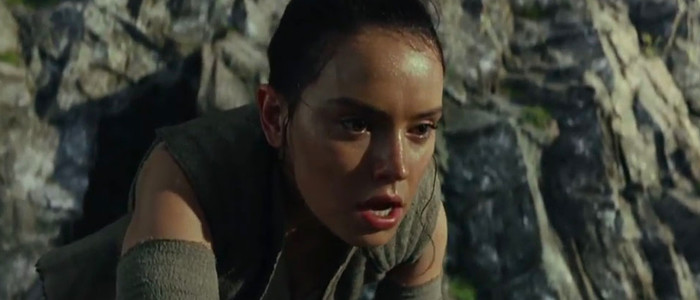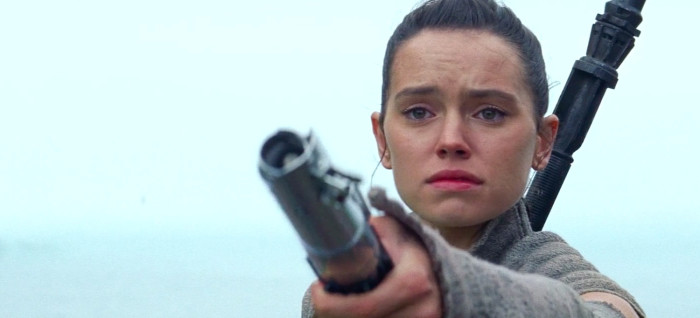Rian Johnson Addresses Rey's Parents In 'Star Wars: The Last Jedi' [Interview]
Who is Rey? Where does she come from? Both Star Wars fans and the character played by Daisy Ridley were obsessed with this question. "Big mystery," she remarked to BB-8 while wandering through the Jakku desert in Star Wars: The Force Awakens. Fans have been theorizing about Rey's parentage for the last two years and Star Wars: The Last Jedi provides a resolution to this question.
Last week, I got to sit down with The Last Jedi writer/director Rian Johnson for a spoiler-filled discussion about the new Star Wars film, and we talked about Rey's parents. Below, find out what Johnson said about this big moment. And then we'll take a look back at what J.J. Abrams told us two years ago.
Naturally, spoilers for Star Wars: The Last Jedi follow.
 In Last Jedi, we get the revelation that Rey is the child of no one of significant value. Can you talk about how you came to that conclusion?
In Last Jedi, we get the revelation that Rey is the child of no one of significant value. Can you talk about how you came to that conclusion?
That was like everything else in the movie, something that I came to through a process of breaking the story and figuring it out. The nice thing was I didn't... I was very thankful there was no slip of paper that was handed to me that said Rey's parents are so and so. The fact that I had the freedom to figure it out meant that for this story I could figure out the most dramatically potent answer to that question.
But you talked to J.J. [Abrams] about it.
I did yeah, oh yeah. Yeah. He didn't, no, he didn't dictate anything to me.
He didn't have any idea?
Well, I don't know. He might have had thoughts in his head who it was going to be, but he didn't dictate them to me. He left it open, you know. First of all, I think I enjoy the notion of disconnecting the idea of tapping into this power in yourself and having it. I like the idea of disconnecting that from lineage. I think that feels "anyone can be President." I think that's kind of nice.
But the bigger thing was, if you look at for example, the Vader "I am your Father" moment from Empire [Strikes Back], I think that moment's so powerful because it's the hardest possible thing that Luke and the audience could hear at that moment. It takes away the easy answers basically. We thought he was just a bad guy that we could hate and want to kill, but that one sentence and suddenly it's more complicated than that. It's harder than that.
If Rey in this movie, if someone had told her yes, here's the answer. You are so and so's daughter. Here's your place in this world. Here you go. That would be the easiest thing she and the audience could hear. It would hand her on a silver platter her place in all this. The hardest thing for all of us to hear and the thing that she doesn't wanna hear and maybe we don't either is that no, this is not going to be something where it's going define you. And the fact that you don't have this is gonna be used against you by Kylo to try and pull him into your orbit. This is going to be hard. And you're gonna have to stand on your own two feet and define yourself in this story.
***
I know that some Star Wars fanboys are very angry that the mystery of Rey's parents turned out to be a dead end of sorts, but I think that Johnson makes a great point from a character point of view. Also, I always hated the idea of the chosen one and midichlorians. I don't like the concept that only special people from special bloodlines can be the hero in this galaxy.
This was actually a question I posed to writer/director J.J. Abrams in 2015 before I got to see Star Wars: The Force Awakens. Considering that Johnson had discussions with Abrams about Rey's heritage, I thought I'd revisit his response in light of the revelation. While Johnson was being a bit vague in my interview above, we learned last month that Johnson and Abrams had come to the same conclusion on Rey's parents.
In December 2015, I asked J.J. Abrams: "Does The Force Awakens explore the possibility that anyone can have the power?" Here's his response:
I will just say this: I would never presume to question anything George Lucas says is canon in Star Wars. And our job was not to negate or undo. A lot of people who are critics of our Star Trek, and I respect all of them, said we destroyed what they loved and negated everything. And we worked hard to clarify that we are not saying that our Star Trek over-rides a thing of the original Star Trek — it was a parallel timeline. I never wanted to negate canon that fans held so dear. And because I love Star Wars and have for too many years... ... And having said all that and meaning it — I don't want to presume over-write or change what George says the rules are.
I'm not someone who quite understands the science of the Force. To me Star Wars was never about science fiction — it was a spiritual story. And it was more of a fairytale in that regard. For me when I heard Obi-Wan say that the Force surrounds us and binds us all together, there was no judgement about who you were. This was something that we could all access. Being strong with the force didn't mean something scientific, it meant something spiritual. It meant someone who could believe, someone who could reach down to the depths of your feelings and follow this primal energy that was flowing through all of us. I mean, thats what was said in that first film!
And there I am sitting in the theater at almost 11 years old and that was a powerful notion. And I think this is what your point was, we would like to believe that when shit gets serious, that you could harness that Force I was told surrounds not just some of us but every living thing. And so, I really feel like the assumption that any character needs to have inherited a certain number of midi-chlorians or needs to be part of a bloodline, it's not that I don't believe that as part of the canon, I'm just saying that at 11 years old, that wasn't where my heart was. And so I respect and adhere to the canon but I also say that the Force has always seemed to me to be more inclusive and stronger than that.

